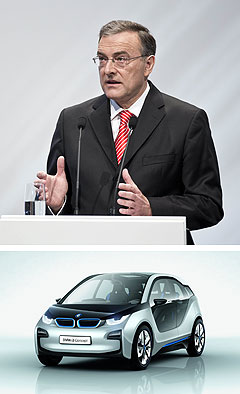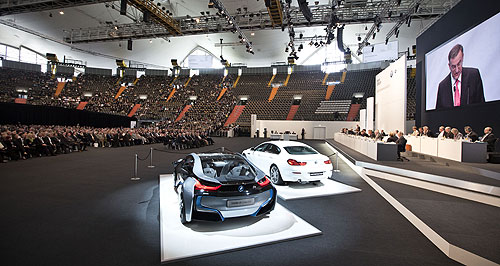Make / Model Search
News - BMWEmissions standards present ‘huge challenge’Electric future: BMW chairman Norbert Reithofer shows shareholders the promised i8 electric car at yesterday’s AGM. BMW chief tells shareholders their company will meet impending new European targets17 May 2012 BMW admits it faces “a huge challenge” to meet European fleet emissions standards proposed for the year 2020, which are expected to be approved by the EU Commission in July. Company chairman Norbert Reithofer told shareholders at yesterday’s annual general meeting that BMW Group needed to intensify the development of plug-in hybrid vehicles and full electric vehicles to meet not only the European standards but others around the world, including the United States. “In Europe, the EU Commission will be voting this summer on a European fleet average of 95gm of CO2 per kilometre for the year 2020,” said Mr Reithofer. “That will be a huge challenge. “In order to meet these ambitious CO2 targets worldwide, we at the BMW Group are intensifying our efforts to develop plug-in hybrids and electric vehicles.” Mr Reithofer said BMW would not only produce more such vehicles, but that they would need to be “cool” and meet BMW’s core value of driving pleasure. “Last year, I promised you, our shareholders, that in 2012 a BMW i model would be parked here right in front of the stage, and there it is – the BMW i8 – an extremely fuel-efficient plug-in hybrid and, above all else, a genuine sports car. “Anyone can see that. And the moment you get behind the wheel you can feel it too. “It embodies the innovative power of BMW, it embodies the DNA of BMW (and) it shows how we plan to develop our DNA into the future. “For alternative drive forms to really gain traction, it will not be sufficient to confine such vehicles to low-fuel consumption or emission-free options.  From top: BMW company chairman Norbert Reithofer, BMW i3. From top: BMW company chairman Norbert Reithofer, BMW i3.“We need “cool” cars – cars that impress customers with their design, their innovative technology and their digital connectivity, cars that are also a compelling option for young people. “I have personally tested the BMW i8 and … BMW ensures electric cars will provide sheer driving pleasure, too. We move people. We trigger emotion – no matter what sort of drive is under the bonnet.” BMW unveiled both the i8 coupe and a smaller i3 city car in Germany in July last year, and announced they would both be built as the company’s first all-electric production vehicles from 2013. Mr Reithofer said BMW had already reduced its European fleet average by 30 per cent since 1995 – from 210g/km to 145g/km – as a result of investing €1.2 billion ($A1.5bn), and would meet the EU legislative targets for 2015. “We are now looking even further ahead,” he said. “By 2020 we want to halve the CO2 emissions of the European BMW Group fleet compared to the mid-1990s.” Mr Reithofer said the US government has also set new carbon emission targets for the year 2025, with valuable credits for electric vehicles. The European Union for many years accepted voluntary agreements with automobile manufacturer associations, but in 2007 the EU’s Council of Environment Ministers formally adopted a resolution for mandatory standards after a review found that many car-makers had failed to meet their objectives. Two years ago, the EU noted that, while Peugeot-Citroen, Fiat, Renault and Volkswagen were well-placed to meet forthcoming standards, both BMW and Daimler had relatively high CO2 emissions – though Daimler’s position had improved after ridding itself of Chrysler. Mr Reithofer said a key plank in BMW’s environmental drive was its Efficient Dynamics program, having sold 5.2 million vehicles with its new technology – exemplified by the new “CO2 champion of the BMW brand”, the BMW 320d Efficient Dynamics Edition that consumes just 4.1L/100km and emits 109g/km. “Efficient Dynamics continues to improve, because vehicle emissions will be subjected to even stricter regulations in the future,” he said. “We are investing in Efficient Dynamics for the combustion engine and hybrid technology, we are investing in new technologies like electric mobility (and) we are investing in new materials like carbon-fibre. “The BMW Group is highly innovative. That makes us an attractive collaboration partner, which is why many manufacturers want to work with us. “Toyota has paved the way for hybrid technology (and) we are now working together on new advances in lithium-ion cell technology. “The BMW Group is the pioneer of state-of-the-art diesel technology and Toyota Europe plans to buy four-cylinder diesel engines from us. “Step by step we are moving towards sustainable mobility. That is what the BMW i family stands for.”  Read more2nd of December 2011  BMW and Toyota join forcesAuto giants enter collaborative deal to develop batteries and share eco technology1st of August 2011  BMW reveals i8 hybrid supercarDesign chief promises eye-catching BMW supercar will stay true to concept29th of July 2011  First look: BMW takes the i roadGround-breaking BMW i3 city-car and i8 super-coupe officially unveiled in Germany |
Click to shareBMW articlesResearch BMW Motor industry news |











Facebook Twitter Instagram